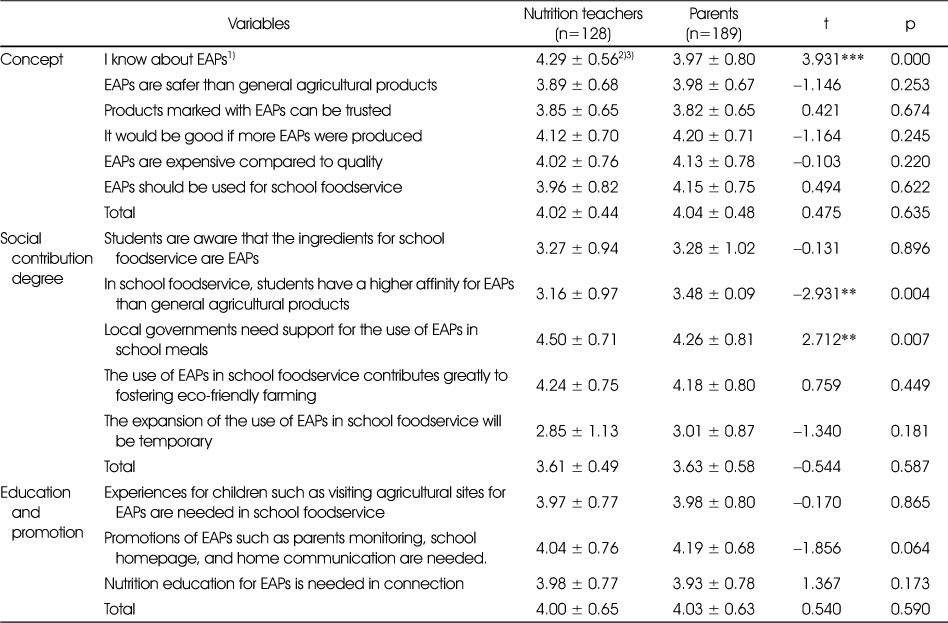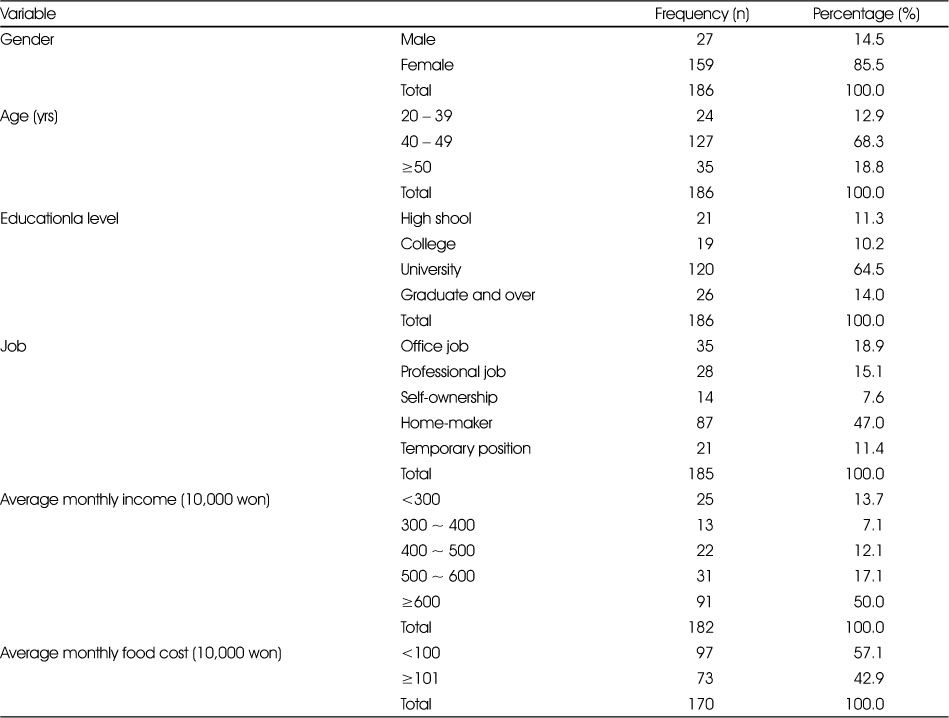Articles
- Page Path
- HOME > Korean J Community Nutr > Volume 24(4); 2019 > Article
-
Research Article
- Recognition of Environmentally-friendly Agricultural Products for School Foodservice of Nutrition Teachers and Parents in 2018 at Seongnam in Gyeonggi province
-
Jisoo Kwon
 , Wookyoun Cho
, Wookyoun Cho
-
Korean Journal of Community Nutrition 2019;24(4):290-299.
DOI: https://doi.org/10.5720/kjcn.2019.24.4.290
Published online: August 31, 2019
1Department of Nutrition Education, Gachon University Graduate School of Education, Korea, Student.
2Department of Food and Nutrition, Gachon University, Korea, Professor.
- Corresponding author: Wookyoun Cho. Department of Food and Nutrition, Gachon University, Seongnam 13120, Republic of Korea. Tel: (031) 750-5972, Fax: (031) 750-5974, wkcho@gachon.ac.kr
Copyright © 2019 The Korean Society of Community Nutrition
This is an Open-Access article distributed under the terms of the Creative Commons Attribution Non-Commercial License (http://creativecommons.org/licenses/by-nc/3.0/) which permits unrestricted non-commercial use, distribution, and reproduction in any medium, provided the original work is properly cited.
- 975 Views
- 2 Download
Abstract
-
Objectives
- This study examined the nutrition teachers' and parents' recognition of environmentally-friendly agricultural products (EAPs) used in school foodservice.
-
Methods
- A questionnaire survey was given to 128 school foodservice nutrition teachers in Seongnam and 189 parents from Oct. 16 to Oct. 31, 2018 at Seongnam in Gyeonggi province. The survey included information on the recognition, satisfaction, and improvement of EAPs, and the results of the two groups were compared.
-
Results
- A comparison of the recognition of EAPs showed that nutrition teachers knew more about the EAPs and local government support in school foodservice than the parents. On the other hand, the parents were more aware than the nutrition teachers in that children have a higher affinity for EAPs than for general agricultural products in the school foodservice. A comparison of the level of satisfaction with the EAPs by nutrition teachers and parents revealed the nutrition teachers to be significantly more satisfied than parents in terms of the color, taste and nutrition of EAPs. Among the items that should be provided with EAPs, more than 50% of each group of nutrition teachers and parents answered that vegetables must be provided first. Some 70.9% of nutrition teachers and 84.5% of parents were aware of the certification standards of EAPs. The nutrition teachers had showed a slightly higher score than the parents in the certification system (3.51 vs. 3.25). In terms of improving the EAPs, 36.2% of nutrition teachers answered a reasonable price preferentially, whereas 56.4% of parents answered maintaining quality. In the expected effects of using EAPs, 57.9% of nutrition teachers answered an improvement of parents' satisfaction on the school foodservice. On the other hand, 38.0% of parents answered an improvement of children' satisfaction on school foodservice.
-
Conclusions
- Nutrition teachers and parents need to be educated on the certification systems that would enhance the trust in EAPs.
- 1. Ahn SC. A study on the perception of environment-friendly agricultural products among dietitians in the capital area. Culin Sci Hosp Res 2014; 20(4): 144-156.
- 2. Kim JM, Kim CS, Jang YJ, Han JH, Ham S. School foodservice nutritionists' perception on the standardization of food ingredients in the procurement system. J Korean Soc Food Cult 2018; 33(5): 427-433.
- 3. Lee YS, Lee NO, Ko SH. A survey on use of environmentfriendly agricultural products for school foodservice by dietitians in Chungnam province. Korean J Community Nutr 2009; 14(5): 556-564.
- 4. Gyeonggido Seongnam Office of Education. A basic direction of school foodservice in 2019 [internet]. 2019; updated 2019 Feb 19]. cited 2019 Feb 28]. Available from: http://www.goesn.kr/main_sub/sub_page.php?id=121&folder_idx=61&folder_page_idx=505&folder_sub_idx=314.
- 5. National Agricultural Products Quality Management Service. Certified agricultural products information [internet]. Environmentfriendly Agricultural Products Certification; 2019; cited 2019 Apr 8]. Available from: http://www.enviagro.go.kr/portal/content/html/info/signintro.jsp.
- 6. Kim SH, Jeong DW, Kim GH. Analysis of the relationship among image, awareness, public confidence of certificate mark for environment-friendly agricultural products, and purchase intension. J Korean Foodserv Manag 2012; 15(6): 359-383.
- 7. Lee JH. The effect of purchasing factors of environment-friendly agricultural products on consumer attitude and purchasing intention. Korean J Culin Res 2016; 22(4): 204-221.Article
- 8. Jeong UK, Sung JH, Lee HJ. 2018 Domestic and foreign environment friendly agricultural market status and task. Korea Rural Economic Institute 2018 09; Report No. 169.
- 9. Sung JH, Lee HJ, Jeong HK. 2017 Domestic and foreign environment friendly agricultural market status and task. Korea Rural Economic Institute 2017 10; Report No. 155.
- 10. Jeong MH, Chae IS. A survey of eco-foodservice perception and satisfaction of elementary school parents in Jeju. J Nutr Health 2015; 48(1): 105-112.Article
- 11. Cho H, Kwon SY, Lee YM, Yoon JH. School dietitians' satisfaction with and needs for school meal service support centers. Korean J Community Nutr 2012; 17(2): 194-204.
- 12. Lee JY, Khil JM, Lee SM, Yum JH. A study on elementary students' perception, satisfaction and demand regarding environment-friendly food services in schools. J Living Cult Res 2011; 26(1): 75-90.
- 13. Jeong JH, Kim EJ, Kim MH, Choi MK. Perception of eco-friendly agricultural products and food service satisfaction of elementary and middle school students according to eco-friendly foodservice day in Chungnam. J Korean Soc Food Sci Nutr 2013; 42(1): 114-119.
- 14. Yang IS, Lee BS, Lee SJ, Kim HY, Lee HY, Jung HY. Parents' perception on using agricultural products in school foodservice operations. J Korean Soc School Health 2006; 19(2): 37-47.
- 15. Chang HS, Lee MJ. The perception for management of school foodservice using of environmentally friendly agricultural products of elementary school children's mothers in Gunsan. Korean J Community Nutr 2008; 13(6): 867-878.
- 16. Kim SA, Cho YS, Kim NR. Satisfaction and recognition level of environment-friendly agricultural products in Cheongju area. Koran J Community Nutr 2011; 16(1): 75-85.Article
- 17. Nam YS, Kim HA. Parents perception on middle school foodservice using environment friendly agricultural products (EFAP) in Masan area. Korean J Nutr 2012; 45(2): 181-191.Article
- 18. Li X, Park DY. Factors influencing on purchase intention of environment-friendly agricultural products for housewives with elementary school children. Proceedings of the Korean Society of Community Living Science 2014 Spring Conference; 2014 Jun 30; Seoul. p. 179-179.
- 19. Lee SI, Kang PY, Jung HY. Parents' perception and satisfaction of school food materials and supplier: performance in Mokpo, Korea. J Korean Soc Food Sci Nutr 2015; 44(11): 1741-1749.Article
- 20. An YU, Kim MH, Choi MK, Kim MH. Perception of use of environment-friendly agricultural products during school foodservice of mothers of elementary school students in Gyeonggido. Korean J Community Nutr 2018; 23(3): 234-242.ArticleLink
- 21. Rho JO, Kim MO. A study on the utilization, recognition, and satisfaction of environment-friendly agricultural products in school food services according to the type of foodservice in Jeonbuk area. Korean J Human Ecol 2011; 20(2): 427-437.Article
- 22. Jang JA, Ahn SW, Choi MK. Actual status of school dietitians' recognition and use of superior agricultural products in Daegu. Korean J Commuity Nutr 2012; 17(3): 312-320.Article
- 23. Park GH. A study on the recognition of school dietitian and utilization of environment-friendly agricultural products in school meal service [master's thesis]. Kyungpook National University; 2013.
- 24. Park SE. A study on use status of environment-friendly agricultural and livestock products & demand for environmentfriendly foodservice [master's thesis]. Kyungnam University; 2018.
- 25. Shin MS. An awareness of environment-friendly farm produce in parents and nutrition teachers [master's thesis]. Kangwon University; 2008.
- 26. Jung MH, Jang MJ, Kim SH. Perception of environment-friendly foods and satisfaction with school meals among students, their parents, and nutrition teachers at elementary schools in the Jindo area, Jeonnam. Korean J Nutr health 2013; 46(4): 369-381.Article
REFERENCES
Recognition of environmentally-friendly agricultural products between nutrition teachers and parents

Satisfaction of environmentally-friendly agricultural products between nutrition teachers and parents

Items to provide priority of environmentally-friendly agricultural products between nutrition teachers and parents

Recognition and reliability of certification system of environmentally-friendly agricultural products between nutrition teachers and parents

Reasons for non-use of environmentally-friendly agricultural products between nutrition teachers and parents

Figure & Data
REFERENCES
Citations

General characteristics of school nutrition teachers
General characteristics of parents
Recognition of environmentally-friendly agricultural products between nutrition teachers and parents
1) Environmentally-friendly agricultural products
2) Mean ± SD
3) 1: strongly disagree, 5: strongly agree
**: p<0.01, ***: p<0.001
Satisfaction of environmentally-friendly agricultural products between nutrition teachers and parents
1) Mean ± SD
2) 1: strongly dissatisfaction, 5: strongly satisfaction
*: p<0.05, **: p<0.01
Items to provide priority of environmentally-friendly agricultural products between nutrition teachers and parents
1) N (%)
*: p<0.05
Recognition and reliability of certification system of environmentally-friendly agricultural products between nutrition teachers and parents
1) Environmentally-friendly agricultural products
2) N (%)
**: p<0.01, ***: p<0.001
3) 1: strongly distrust, 5: strongly trust
Reasons for non-use of environmentally-friendly agricultural products between nutrition teachers and parents
1) N (%)
***: p<0.001
Preferred improvement needs of environmentally-friendly agricultural products between nutrition teachers and parents
1) N (%)
**: p<0.01
Expected effect on the use of environmentally-friendly agricultural products between nutrition teachers and parents
1) N (%)
2) Environmentally-friendly agricultural products
***: p<0.001
1) Environmentally-friendly agricultural products 2) Mean ± SD 3) 1: strongly disagree, 5: strongly agree **: p<0.01, ***: p<0.001
1) Mean ± SD 2) 1: strongly dissatisfaction, 5: strongly satisfaction *: p<0.05, **: p<0.01
1) N (%) *: p<0.05
1) Environmentally-friendly agricultural products 2) N (%) **: p<0.01, ***: p<0.001 3) 1: strongly distrust, 5: strongly trust
1) N (%) ***: p<0.001
1) N (%) **: p<0.01
1) N (%) 2) Environmentally-friendly agricultural products ***: p<0.001

 KSCN
KSCN




 Cite
Cite


